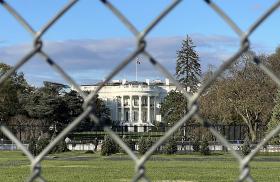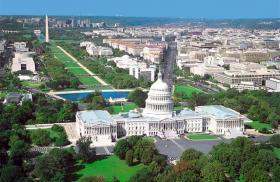

A distinguished panel of experts and veteran diplomats sets the stage for the president’s historic White House visit, examining critical U.S., Israeli, and Syrian issues as well as lessons from past diplomatic efforts.
On November 7, The Washington Institute held a virtual Policy Forum with James Jeffrey, Michael Herzog, Michael Jacobson, and Anna Borshchevskaya. Jeffrey, the Institute’s Philip Solondz Distinguished Fellow, formerly served as U.S. special representative for Syria and ambassador to Iraq and Turkey. Herzog is the Institute’s Tisch Distinguished Fellow and former Israeli ambassador to the United States. Jacobson is a senior fellow in the Institute’s Reinhard Program on Counterterrorism and Intelligence and former director of strategy, plans, and initiatives in the State Department’s Counterterrorism Bureau. Borshchevskaya is the Grinspoon Senior Fellow in the Institute’s Diane and Guilford Glazer Foundation Program on Great Power Competition and the Middle East. The following is a rapporteur’s summary of their remarks.
James Jeffrey
With progress being made on the Gaza ceasefire, Syria is now the most important issue for the United States to get right in the Middle East, with unity, stability, and economic development being the most crucial matters to address. Unity is paramount, since the lack of it feeds violence, uncertainty, and investor doubts.
Relations between Damascus and the Kurds in the northeast are the most pressing factor affecting national unity. The United States maintains close relations with both parties and must therefore play a key role in negotiations between them. Talks have stalled so far and could collapse, especially given Turkey’s growing impatience over the perceived Kurdish security threat along its southern border.
To avoid that scenario, Washington must push the Kurds to take initial symbolic steps that show they acknowledge themselves as part of the new Syria. These could include allowing government personnel to monitor border crossings between Iraq and Turkey, formalizing the oil trade with Damascus, and/or providing an official commitment not to export oil from the northeast without permission from the government.
At the same time, Damascus must take real steps to assuage Kurdish fears, recognizing a degree of local autonomy on matters such as language rights, administration, and police control. The Iraqi constitution could be a useful model in this regard—despite not being directly replicable in Syria, it has granted various responsibilities and controls to the Kurdistan Regional Government in northern Iraq.
Convincing Syria’s minorities to engage with Ahmed al-Sharaa’s government will not be an easy task for the international community, particularly following the violence against Alawites along the coast and Druze in the south. Guarantees from Damascus alone will not be sufficient to assuage their fears. In a nearly impossible situation, the main guarantor must be the international community, with the United States taking the lead and making clear that unity and nonviolence are the unshakeable pillars required for working with all sides in Syria. The international community has an interest in seeing a unified Syria and ensuring that the Druze and Kurds are respected and secure.
Michael Herzog
When Israel looks to Syria, it sees both opportunities and risks. The biggest source of opportunity is the fact that both Israel and Ahmed al-Sharaa regard Iran and its “axis of resistance” as an enemy. Syria is no longer a vital link in the Iranian axis, which is primarily a result of Israel’s military victories over the past two years. Israel and Sharaa both aspire to prevent Hezbollah from reentering Syria, and both are working to counter weapons smuggling through the country to Hezbollah in Lebanon. Additionally, Sharaa’s desire for strong relations with the United States is welcomed by Israel, which prefers to see him aligned with its friends rather than with rivals.
At the same time, there are concerns in Israel over Sharaa’s militant background, orientation, and level of control in Syria. Specifically, Israel is concerned about the potential militarization of southern Syria with hostile elements basing themselves there and posing a threat near Israel’s borders. As a lesson from Hamas’s attack on October 7, Israel will no longer tolerate the emergence of threats in its immediate surroundings. Israel therefore seeks a security deal that will effectively demilitarize southern Syria (south of Damascus)—one with a new structure, not the outdated 1974 disengagement agreement.
In addition, Israel is highly concerned about Sharaa’s attitude toward the Druze community. This attitude is perceived as posing a threat to the security, well-being, and inclusion of the community in Syria. The violence in Suwayda in recent months confirmed that view. While small in terms of population, the Druze community in Israel is influential, with many serving in the Israel Defense Forces, and it has applied pressure on the Israeli government to actively defend Syria’s Druze.
Finally, Israel is concerned about Turkey’s ambitions in Syria, particularly its desire to establish a military/air presence in the country, which could limit Israel’s freedom of action against threats there and beyond (Iran). Earlier this year, Israel bombed the Syrian air bases that Turkey was considering using as military bases. Israel sees Turkey as trying to fill some of the void left by Iran and possibly establish a Sunni Islamist political axis across the Middle East that is hostile to Israel.
To address these significant concerns, Israel has entered direct talks with the Syrian government, including an active U.S. mediating role, aimed at reaching a security deal that anchors Israel’s security interests while safeguarding its freedom of action in Syria if the situation worsens and the Syrian government appears unwilling or unable to implement the deal. Maintaining such freedom of action was secured, for example, in the U.S.-brokered Israel-Lebanon ceasefire of November 2024. The United States is key to the success of these negotiations, given its unique ability to bridge gaps with Syria and Turkey and to serve as Israel’s guarantor. Israel has had negative experiences with the United Nations in terms of peacekeeping, enforcement, and observation, whereas it has had positive experiences with the United States through the Multinational Force & Observers in Egypt’s Sinai Peninsula.
Having changed the Middle East strategic landscape in the last two years and entered a ceasefire in Gaza, Israel is now seeking to expand the circle of security/peace/normalization arrangements in the region. At this point, a security deal with Syria appears more promising than other regional opportunities.
Michael Jacobson
One topic that will likely be addressed during Sharaa’s visit is Syria’s status as a State Sponsor of Terrorism (SST), a designation it has been under since 1979. While the Trump administration has not confirmed whether Syria will be removed from the list, this step seems likely, in part because the country is expected to join the Global Coalition to Defeat the Islamic State (IS). President Trump has also indicated his desire to remove all sanctions on Syria. The SST designation carries some restrictions that he will likely want to see lifted, which would make it easier for the United States to provide assistance that helps Damascus fight terrorism more effectively.
Ideally, however, the administration should wait to remove the SST designation, if only because Syria’s counterterrorism environment remains fluid. To be sure, Damascus has made significant counterterrorism progress, cooperated with the United States to target IS, cracked down on Iran and Hezbollah, and removed many Palestinian terrorists. Yet there is no clarity on the overall foreign fighter issue, even after Washington altered its expectation that Syria remove such individuals as part of President Trump’s “five points” to Sharaa in May. Damascus has also yet to issue a clear plan for assuming responsibility over IS detention centers in the northeast.
If the administration decides to remove the SST designation, it should require robust written assurances from Sharaa’s government on counterterrorism, including commitments to work against IS, develop a plan for the northeast detention centers, cooperate with the United States on countering Iran and Hezbollah, and maintain a zero tolerance policy regarding terrorist activity by foreign fighters. The SST designation is flexible, making it easy for the secretary of state to remove or add countries to the list should expectations go unmet.
There are two possible paths for delisting a country. One path allows for an SST designation to be formally removed forty-five days after the president notifies Congress that the government in question has not supported international terrorism over the previous six months, along with assurances from that government that it will not resume such support in the future. The second path allows for a designation to be lifted immediately after the president certifies that there has been a “fundamental change” in a government and it is no longer involved in any type of terrorist activity. The Trump administration should pursue the first path with Syria, which would allow time for Congress to add accountability measures and requirements on Damascus.
The administration can also use Syria’s current status as a “Not Fully Cooperating Country” as another point of leverage that carries some restrictions. Yet the Caesar Act has the largest impact on the Syrian economy, and repealing it is currently in conference on Capitol Hill. While questions remain about whether the president is moving too quickly to lift sanctions on Syria, there is significant bipartisan support for repealing the Caesar Act.
Anna Borshchevskaya
Russia is playing the long game in Syria, and there is no indication that Damascus will abandon Moscow. In addition to Russia’s long history there, the country plays an important role in Vladimir Putin’s desire to spread its power and influence across the Middle East. While Bashar al-Assad’s fall was a setback for Moscow, it has not deterred Putin from continuing to assert himself. Russia retains its military bases in Syria—a striking development given the assistance it provided to Assad in committing war crimes against the people and bombing Hayat Tahrir al-Sham, the militant group Sharaa used to lead.
One reason for the continued ties between Moscow and Damascus is that Syria is having a difficult time weaning itself from Russian assistance such as printing Syrian currency and providing military supplies. There is currently no alternative source for either of these needs. Russia is also engaging with Syria economically by providing oil and resuming wheat deliveries. In addition, it has sought to stay relevant by maintaining ties with all internal and external actors in the Syria file.
Putin is not concerned about President Trump’s meeting with Sharaa. While Syria’s current pursuit of ties with the West and Ukraine are positive developments, Trump’s “five points” notably did not include expelling Russia. Putin is watching the events currently unfolding and is likely confident that Washington’s attention span will be short and focused on the wrong priorities. Therefore, the United States must remain engaged in Syria and make it a priority in order to prevent Russia from taking advantage of the situation. If U.S. engagement persists, Moscow’s local influence could begin to wane.
This summary was prepared by Ari Nagle. The Policy Forum series is made possible through the generosity of the Florence and Robert Kaufman Family.






